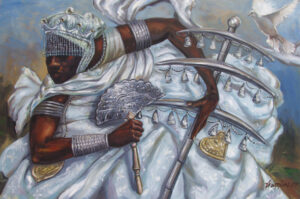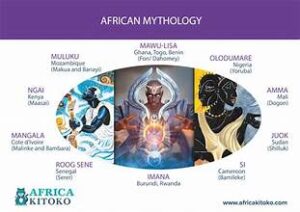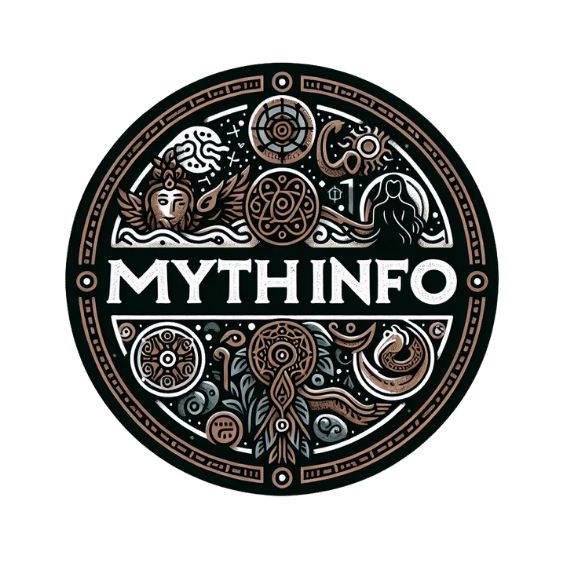Introduction
Africa is a continent rich in diverse cultures, languages, and histories, each contributing to a tapestry of profound mythological traditions. The mystical world of African myths provides insights into the spiritual and cultural values of various ethnic groups, revealing how these stories and beliefs shape their understanding of the world. This article explores the legendary stories and beliefs of African mythology, diving into the spiritual essence and cultural significance that these myths hold.
The Significance of Myths in African Cultures
African myths serve as foundational elements in many societies, offering explanations for natural phenomena, human experiences, and cosmic events. They are not merely stories but living traditions passed down through generations, often recited by griots (storytellers) who play a vital role in preserving cultural heritage. These myths encapsulate moral values, historical events, and religious beliefs, providing a framework for understanding life and existence.
Major Themes in African Myths
- Creation Myths
Creation myths are central to African mythology, offering various interpretations of how the world and humanity came into existence. For instance, the Yoruba people of Nigeria believe in Olodumare, the supreme deity, who created the world and its inhabitants. The myth recounts how Olodumare sent the god Orunmila to bring order to chaos and create the earth.
Similarly, the Akan people of Ghana have a creation myth involving Nyame, the sky god, who created the world from nothing. Nyame’s involvement in the creation process highlights the belief in a divine being responsible for the origin and sustenance of life.
- Deities and Spirits

African myths are populated by a pantheon of deities and spirits, each associated with various aspects of life and nature. The Zulu people revere Unkulunkulu, the creator god, who is believed to have made the first humans and taught them essential skills for survival.
In the Dogon culture of Mali, the Nommo, ancestral spirits, are central to their cosmology. These beings are considered the first creatures to inhabit the earth and are associated with water and fertility.
- Heroic Epics
Heroic epics in African mythology often involve legendary figures who embark on quests, overcome obstacles, and achieve greatness. One prominent example is the epic of Sundiata Keita, the founder of the Mali Empire. This epic chronicles his journey from a crippled boy to a mighty king, highlighting themes of resilience, leadership, and destiny.
The tale of Anansi, the spider trickster from the Ashanti people, is another famous example. Anansi’s stories often contain lessons about cleverness, cunning, and the importance of wit over brute strength.
- Myths of Life and Death
African myths also address the mysteries of life and death, offering insights into the beliefs about the afterlife and ancestral veneration. Many cultures believe in the continuity of life beyond death, with ancestors playing a crucial role in guiding and protecting the living.
The Maasai people of Kenya hold a belief in a spiritual realm where ancestors reside, influencing the lives of their descendants. Rituals and ceremonies are conducted to honor these ancestors and seek their blessings.
Influence on Art and Culture
African myths have significantly influenced art, music, and cultural practices across the continent. Traditional African art often depicts mythical beings, deities, and legendary stories, serving as a visual representation of these ancient beliefs. Masks, sculptures, and paintings are imbued with symbolic meanings related to the myths and spiritual practices of the community.
Music and dance are also integral to the expression of African myths. Rituals and ceremonies often feature songs and dances that recount mythological stories and celebrate the deities and spirits. These performances help to reinforce cultural identity and transmit the myths to future generations.
The Modern Relevance of African Myths
In contemporary times, African myths continue to inspire and resonate with people both within and outside the continent. They offer a sense of cultural continuity and identity, connecting individuals to their heritage and ancestral roots. Modern interpretations of these myths often blend traditional elements with contemporary forms of expression, reflecting the dynamic nature of African culture.
Additionally, African myths have garnered global interest, contributing to the broader understanding of human diversity and spirituality. They provide valuable perspectives on universal themes such as creation, morality, and the human condition.
Conclusion
Exploring the mystical world of African myths reveals a rich tapestry of stories and beliefs that are integral to the continent’s cultural and spiritual landscape. These myths offer profound insights into the values, traditions, and worldviews of various African societies, showcasing the enduring relevance of these ancient narratives. By delving into these legendary stories, we gain a deeper appreciation for the diversity and complexity of African culture and its contributions to global heritage.


